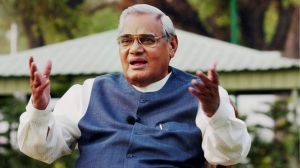Time to accumulate for long-term
Correction in the markets seems likely-investors should up equity allocation with corrections.
The Bombay Stock Exchanges benchmark 30-scrip index,Sensex,fell by over 700 points in a day for a second time in the last seven weeks. It lost over 900 points in the last two trading sessions itself. There is no denying that stock markets may remain weak for some time as sovereign risks across Europe and recessionary fears in the US gather momentum. Experts say that while volatility is expected to prevail,investors should not repeat the mistake they committed during the 2008 fall when they exited the markets. They should rather consolidate their holdings with every fall.
All is not well?
Things across the globe are changing fast and certainly not for good. Concerns over a likelihood of recession in US have gained credence after the Federal Reserve presented the latest economic outlook. There is also growing fear of weakness in banks in the European region. While Greece,Portugal and Ireland have already sought funds from the European Union,Spain and Italy may need them too. On top of this,reports of a slowdown in China and Germany have only added to the anxiety of traders and investors.
India is not isolated in this world of turmoil. While 25-30 per cent of our GDP growth is connected to global markets,one-third of our floating stocks are held by foreigners. Hence the global volatility will affect the Indian markets, says Sandesh Kirkire,CEO,Kotak Mahindra AMC.
A sharp depreciation in rupee by over 10 per cent in just about a month added to the growing woes of the government that has been on a war against inflation for over 18 months now without any success. The Reserve Bank of India has raised key policy rates by 12 times to counter inflation and while it has not received the desired result,high input costs and a sluggish 3.3 per cent growth of industrial output in July indicates that the performance of Indian companies in the second quarter may be below expectations.
With these pressures in the horizon,there is no likelihood of any sharp revival in foreign institutional investors inflow in the near future. Investors globally are looking to take refuge in safer currencies and bonds,stability in the domestic currency in the coming days may lead them to India.
While foreign institutional investors will look at India,they will wait for the current volatility in the rupee to stabilise and start to appreciate, said CJ George,MD,Geojit BNP Paribas Financial Services.
The silver lining
Amidst all negativities,the Indian economy has a glimmer of hope. With a slowdown in growth and demand worldwide,commodity prices will soften and a fall in oil prices can come as a big positive for India which imports more than 70 per cent of its oil requirement.
It is now clear that developed markets are going through a bad phase and in a low growth phase there will be a commodity slump. In such a scenario,there will be lesser pressure on the Indian currency and the input cost too would fall,and these are a few positives for our economy, says Kirkire.
Others agree and feel that a drop in commodity prices was certain.
When the global economy slows down,the commodity prices come off and there is every likelihood of a softening in the commodity prices. We have not seen a meaningful dip in commodity and would like to see a more meaningful dip in crude, said Sankaran Naren,CIO,ICICI Prudential AMC.
A dip in crude prices would mean a dip in inflation too. And with inflation coming down,the Reserve Bank of India may go for a series of rate cuts that may push growth and we may be at the end of the interest rate hike period.
It is a complex market for the investors as things are still complicated in Europe and the US and high interest rates in India are killing growth. However we may be at the end of the high interest rate regime, said George.
What should the invester do?
It is a bad market for traders but not so bad for long term retail investors. While the Sensex is trading at a discount of 18.6 per cent to its value a year back,the average return of the large equity funds is down by 17 per cent and so are their NAVs in the same period and thus it throws open a good opportunity to consolidate holdings for better long term returns.
Even blue chip stocks with strong fundamentals are trading at a discount of up to 40 per cent or even more over their 52-week highs see table. As we are towards the end of a rising interest rate cycle,this is the time when investors should look at companies that have a good management,strong fundamentals and have taken a beating, said George.
While stocks pose opportunity,mutual funds too pose opportunity and hence investors must continue with their systematic investment plans. Almost everything looks corrected and thus investors should maintain their asset allocation in equities and slowly increase their allocation with further correction, said Naren.
sandeep.singhexpressindia.com
- 01
- 02
- 03
- 04
- 05































